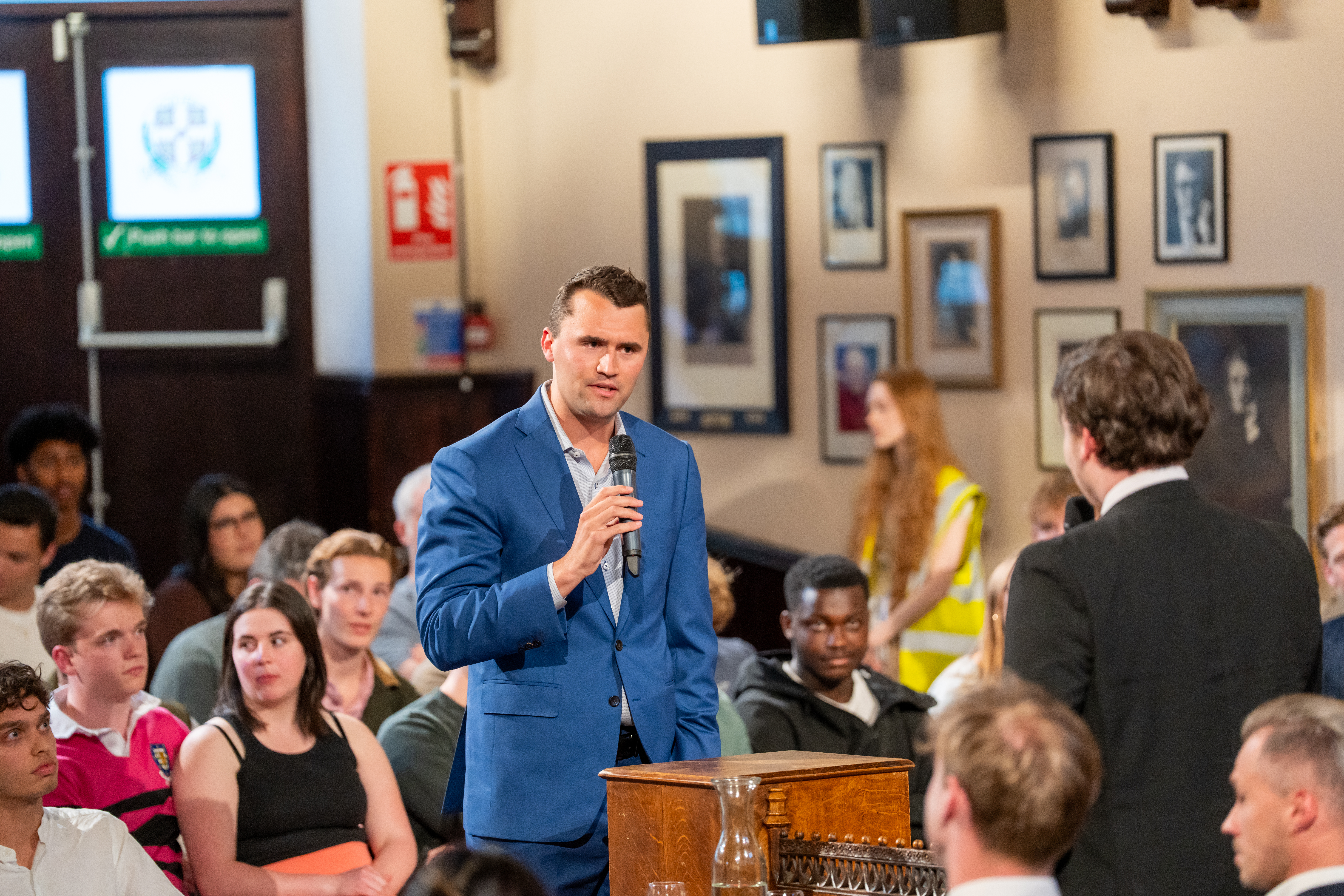By Harriet Marsden
Copyright theweek

SUBSCRIBE & SAVE
Less than $3 per week
View Profile
The Explainer
Talking Points
The Week Recommends
Newsletters
From the Magazine
The Week Junior
Food & Drink
Personal Finance
All Categories
Newsletter sign up
today’s big question
Is the UK government getting too close to Big Tech?
US-UK tech pact, supported by Nvidia and OpenAI, is part of Silicon Valley drive to ‘lock in’ American AI with US allies
Newsletter sign up
Starmer’s government has hailed the pact but critics say it makes the UK ever more reliant on US tech firms
(Image credit: Illustration by Stephen Kelly / Shutterstock / Getty Images)
Harriet Marsden, The Week UK
18 September 2025
The “circus” of Donald Trump’s state visit this week might make the technology pact between the US and the UK “easy to miss”, said Politico. But it is “impossible to ignore” the “technology heavyweights” among the US president’s entourage – including OpenAI’s Sam Altman, Blackstone chief executive Stephen Schwarzman, and Nvidia CEO Jensen Huang.
Trump and Keir Starmer have agreed a tech industry partnership, backed by Nvidia and OpenAI, which will see top US firms, including Microsoft, pledge to invest billions in the UK’s artificial intelligence infrastructure. David Hogan, vice president for enterprise at AI chip maker Nvidia, told reporters his company’s own £11 billion injection would help “make the UK an AI maker, not an AI taker”.
Starmer’s government has hailed the pact as “tech prosperity deal”. But critics say it makes the UK ever more reliant on US tech firms. Britain risks being “a kind of vassal state, technologically”, picking up “sloppy seconds from Silicon Valley”, said Nick Clegg, Meta’s former vice president of global affairs.
Escape your echo chamber. Get the facts behind the news, plus analysis from multiple perspectives.
SUBSCRIBE & SAVE
Sign up for The Week’s Free Newsletters
From our morning news briefing to a weekly Good News Newsletter, get the best of The Week delivered directly to your inbox.
From our morning news briefing to a weekly Good News Newsletter, get the best of The Week delivered directly to your inbox.
What did the commentators say?
The UK-US deal involves “big numbers”, said The Guardian. Microsoft will invest £22 billion in cloud and AI infrastructure, as well as in a planned supercomputer in Loughton, Essex, in what it calls “a major commitment to the UK”.
As part of a data centre development project focused in the northeast of England, OpenAI will provide access to its AI tools and technology, Nvidia will offer the chips that power the models, and the UK government will supply the energy, sources told the Financial Times. There has been an “explosion” of such deals between Nvidia and other governments across Europe and Asia that have “proven receptive” to the company’s argument that developing national AI infrastructure is “critical”. When the Nvidia CEO met Starmer in June, he “warned that the UK lacked the digital infrastructure needed to give it an edge in the race to build its national AI industry”.
This notion of AI sovereignty “borders on meaningless” because so many businesses already “rely on American cloud companies”, said Bloomberg’s Parmy Olson. “The US owns about 75% of the world’s AI supercomputers, China has about 15%, with the remaining 10% distributed elsewhere.” The UK can only boast 3% of “world compute capacity” – an “impossibly wide gap” to bridge.
The UK government has also announced a £400 million deal for defence and intelligence services with Google Cloud. “The public deserves to understand who really benefits from these partnerships and what the return will be for taxpayers in years to come,” Gaia Marcus, director of the Ada Lovelace Institute think tank, told Politico.
Sign up for Today’s Best Articles in your inbox
A free daily email with the biggest news stories of the day – and the best features from TheWeek.com
Contact me with news and offers from other Future brandsReceive email from us on behalf of our trusted partners or sponsorsBy submitting your information you agree to the Terms & Conditions and Privacy Policy and are aged 16 or over.
When Technology Secretary Peter Kyle announced an earlier partnership with OpenAI in the summer, he said it would “support the UK’s goal to build sovereign AI in the UK”. But he failed to explain “exactly how putting more key digital infrastructure in the hands of a US tech giant” will do so, said Donald Campbell in Byline Times. Binding the UK into deals with Google and OpenAI “not only opens up our data to train their tools, but will force us to be a rule-taker from Silicon Valley, with little agency over our own digital future”.
The US tech companies are “working with Trump” to advance a “distinctly ‘America first’ agenda” in which dominance is secured by rolling out US AI products across the world. This is about “locking in as many countries as possible to US tech infrastructure and products, so that they are under control of those businesses and, by extension, their government – with the gap between the former and the latter growing narrower by the day”.
The AI plans are likely to raise concerns, said The Guardian, about the UK’s “under-pressure water supplies”, as huge amounts of water are needed to cool down energy-intensive data centres.
Meanwhile, European states and the European Commission are “talking about how to start moving away from US tech dominance, and the overwhelming control of cloud computing” by US firms, said Campbell. “The contrast with the UK is stark.” Government ministers are, at best, “burying their heads in the sand. At worst, they’re suffering from Stockholm Syndrome – enthusiastically embracing the crushing grip of the tech giants.”
Harriet Marsden, The Week UK
Social Links Navigation
Harriet Marsden is a writer for The Week, mostly covering UK and global news and politics. Before joining the site, she was a freelance journalist for seven years, specialising in social affairs, gender equality and culture. She worked for The Guardian, The Times and The Independent, and regularly contributed articles to The Sunday Times, The Telegraph, The New Statesman, Tortoise Media and Metro, as well as appearing on BBC Radio London, Times Radio and “Woman’s Hour”. She has a master’s in international journalism from City University, London, and was awarded the “journalist-at-large” fellowship by the Local Trust charity in 2021.
Russia’s war games and the threat to Nato
Incursion into Poland and Zapad 2025 exercises seen as a test for Europe
Eurovision faces its Waterloo over Israel boycotts
Talking Point
Five major broadcasters have threatened to pull out of next year’s contest over Israel’s participation
What is Donald Trump’s visit worth to the UK economy?
In the Spotlight
Centrepiece of the president’s trip, business-wise, is a ‘technology partnership’
You might also like
Google: A monopoly past its prime?
Google’s antitrust case ends with a slap on the wrist as courts struggle to keep up with the tech industry’s rapid changes
Albania’s AI government minister: a portent of things to come?
In The Spotlight
A bot called Diella has been tasked with tackling the country’s notorious corruption problem
South Korea’s divide over allowing Google Maps
Talking Points
The country is one of few modern democracies where the app doesn’t work
The tiny Caribbean island sitting on a digital ‘goldmine’
Under The Radar
Anguilla’s country-code domain name is raking in millions from a surprise windfall
GPT-5: Not quite ready to take over the world
OpenAI rolls back its GPT-5 model after a poorly received launch
Google avoids the worst in antitrust ruling
A federal judge rejected the government’s request to break up Google
Broken brains: The social price of digital life
A new study shows that smartphones and streaming services may be fueling a sharp decline in responsibility and reliability in adults
Deep thoughts: AI shows its math chops
Google’s Gemini is the first AI system to win gold at the International Mathematical Olympiad
View More ▸
Contact Future’s experts
Terms and Conditions
Privacy Policy
Cookie Policy
Advertise With Us
The Week is part of Future US Inc, an international media group and leading digital publisher. Visit our corporate site.
Future US, Inc. Full 7th Floor, 130 West 42nd Street



